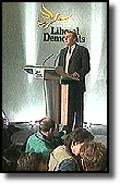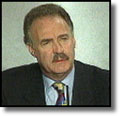
|
The Liberal Democrat Campaign
Background
The Liberal Democrats entered the 1997 general election campaign in good shape. By-election victories and the defection from the Conservatives of Emma Nicholson and Peter Thurnham had boosted the party's ranks from 20 MPs in 1992 to 26 by 1997. Despite the high numbers, not everything in the Lib Dem garden was rosy. The party's vote share was, according to the opinion polls, significantly lower than in 1992. Some polls even showed the Liberal Democrats flirting with single figures. There was also the Blair effect. Would the New Labour leader attract large numbers of votes away from the Liberal Democrats as the Labour Party marched firmly into the centre ground of politics, traditional Lib Dem territory. Even with uncertainty about Mr Blair's impact, Paddy Ashdown dropped his party's traditional stance of "equi-distance" between Labour and the Conservatives. He made it quite clear in the run-up to the election that the Lib Dems would support Labour in the event of a hung Parliament.
Labour and the Liberal Democrats also agreed to work together on constitutional reform, but Mr Ashdown firmly denied charges from the Conservatives that he was "cosying-up" to Labour, saying he would support Labour when it was in the national interest to do so and oppose them on the same grounds. The final worry for the Lib Dems, as they approached the election, was money. Unlike Labour and the Conservatives, who relied on the unions and businessmen for support, the Lib Dems were forced to rely on individual donations - leaving them a mere £2.5 million to fight the entire general election campaign. The other parties spent much more than that on campaign posters alone. Lack of funds meant the Liberal Democrats could campaign seriously only in 50 key target seats. Lord Holme, the Liberal Democrat campaign manager admitted the Lib Dem campaign would have to be "lean and mean".
Campaign
Once the election campaign was under way, it quickly began apparent that Labour's decision to move closer to the Tories had opened up a gap in the political market the Lib Dems were happy to occupy. With the two main parties both rigidly committing themselves to low taxation, they were open to the oft repeated remark from the Liberal Democrats that neither of them could make a difference. If you wanted a better education system, only the Lib Dems were committed to spending more money; if you wanted a better health service only the Lib Dems were prepared to pay the price. As Paddy Ashdown said, "The more you vote for us, the more of our policies you will get."
The televised leadership debate that never happened, along with sleaze, dominated the first two weeks of the campaign. It highlighted the perennial problem suffered by Britain's third party. If the debate were to go ahead, it was argued that Paddy Ashdown could not expect equal footing with Mr Blair and Mr Major because whatever happened on May 1 he was not going to be prime minister. If the Liberal Democrats could not hope to govern themselves, how would they define success? If, as looked likely, Labour was heading for a landslide, surely the Liberal Democrats would be irrelevant in Parliament? It was a thorny issue for the Lib Dems, for although in the event of a Labour landslide they would gain more seats - they would paradoxically have less influence. Only if there were a hung Parliament could the Lib Dems expect to taste real power. But despite this, the former Labour cabinet minster and now Liberal Democrat peer Baroness Williams was optimistic. As she toured the length and breadth of the county she bet money that the Lib Dems would win upwards of 40 seats, which would be their greatest total for nearly 70 years.
Manifesto - Make the Difference
The launch of the Lib Dem manifesto flagged their claims that only they could "make the difference". As in the 1992 election, a commitment to education was at the centre of Lib Dem plans for Britain. Mr Ashdown hoped to make Britain an "educational superpower". To do this, the Lib Dems pledged to increase spending on education by £2 billion a year by putting a penny on income tax.
Mr Ashdown was firm in his conviction that, "Most people are prepared to pay a little more, provided they know it will be spent on smaller classes, shorter waiting lists and specific improvements in the services their families rely on." This open commitment to higher taxes put the Lib Dems light-years away from both Labour and the Tories who had, Mr Ashdown said, "the same spending limits, the same tax plans and the same failure to explain how anything will be paid for". The openness and honesty of the Lib Dems seemed to win the respect of friend and foe alike. The other key points of the manifesto were proportional representation, increasing the higher rate of income tax to 50%, taking 500,000 of Britain's poorest people out of income tax altogether, and adding five pence to the price of a packet of cigarettes - with the extra revenue earmarked for the health service.
The Lib Dem campaign, under the direction of Lord Holme, ran very smoothly, apart from one blip. When a nurse approached the Lib Dems with the story of the needless death of a young man due to what she described as the Conservative mismanagement of the health service, Mr Ashdown was accused of "shroud waving". The nurse's story was plugged during a Lib Dem news conference, with the nurse's statement read by an actress. "His death had upset everyone...most of us think that if he had been admitted straight away he might have been able to have chemotherapy." Mr Ashdown repeated the line that only the Lib Dems had pledged to increase health spending, but with the controversy created by the nurse's story the message struggled to get through. Many commentators made comparisons to Labour's muddle over the Jennifer's Ear broadcast in 1992. In a further attempt to make themselves appear distinctive from the other two parties, the Liberal Democrats were at pains to discuss the issues - rather than indulging in what they described as the Punch and Judy style of politics they believed had been adopted by Labour and the Conservatives. It seemed to be a popular decision. As the campaign progressed, the Liberal Democrats appeared to be the only party consistently nudging up in the polls. Labour support dropped slightly while the Conservatives remained fairly constant. With polling only hours away, Paddy Ashdown dropped his by now perennial refusal to comment on the election's outcome to announce to supporters that the Lib Dems were on the verge of "the greatest breakthrough any third party has achieved since the Second World War". Anything in excess of 30 MPs would be seen as a victory.
By the time results began coming in on the night of May 1, it was quickly becoming clear that not only was Labour set to return to power by a landslide majority but the Liberal Democrats were exceeding all expectations. Both Paddy Ashdown and Baroness Williams were proved right. The Lib Dems won 46 seats, their highest total since 1929. The new total surpassed the high-water mark of the SDP-Liberal Alliance, which achieved a total of 43 seats in the early 1980s. The Lib Dem success was down to careful targeting of winnable seats and tactical voting by Labour supporters voting Lib Dem where they were the clear challengers to the Conservative candidate. Despite the increase in seats the party's share of the vote was actually slightly down compared to 1992.
Many of the new Lib Dem seats were picked up in southern and south-west England and London. The Liberal Democrats are able to put together a full shadow cabinet for the first time in many years. |
Diana, Princess of Wales, 1961-1997
Conference 97
Devolution
The Archive
News |
Issues |
Background |
Parties |
Analysis |
TV/Radio/Web
Interactive |
Forum |
Live |
About This Site
News |
Issues |
Background |
Parties |
Analysis |
TV/Radio/Web
Interactive |
Forum |
Live |
About This Site
© BBC 1997 |
politics97@bbc.co.uk |




